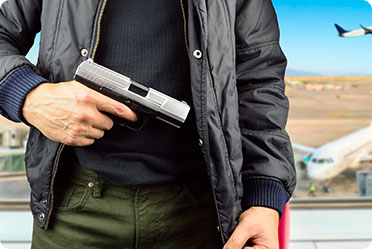
I hope you enjoy my most recent interview with Austin Hill. You can listen to us banter about the recent LAX shooting serving as the inspiration for liberals to propose more gun control – just click here.
An interesting issue that came up during our discussion is gun control in airports. I previously had the pleasure of speaking to the Idaho Aviation Association about this topic, and Pilot Getaways magazine interviewed me for an article on the subject as well. That article is slated to appear soon (the November/December 2013 issue), so watch for it if you are a pilot or otherwise interested in guns in airports and aircraft.
Gun laws in general are complex, and the legality of the possession or transfer of a firearm must be deciphered under federal, state, and local laws. You must comply with all applicable laws, and if you’ve ever attempted to research an issue (such as whether you can carry a gun for self-defense in an airport) you’ve realized how elusive the answer can be.
When I analyze the legality of carrying a firearm, I look at the person (federal and state laws prohibit certain people from possessing a firearm), the type of firearm (also subject to federal and state laws), the manner of carrying (open, concealed, disassembled & inoperable), and the location the firearm will be carried (private property, state or local government building, federal facility, school, city limits, etc.). Federal and state laws (and sometimes local ordinances) apply to each of these factors. Every applicable law must be separately read, understood, and applied to the situation. Sound complicated? It is.
Municipal airports pose a particularly tricky analysis. Federal laws only restrict the manner in which firearms can be possessed on certain aircraft and in “sterile areas” of the airport. For non-sterile areas (ie the lobby, as mentioned by Austin Hill in the above interview), state law (and local laws if allowed in your jurisdiction) may restrict who and under what circumstances a firearm can be possessed. There are also different rules for private versus commercial aircraft.
In Idaho, our statutes allow a private pilot and the pilot’s invited guests to have firearms on a private plane if the firearm is properly stored or in the custody of the pilot of the aircraft. Idaho also allows hunters chartering an aircraft for the purpose of hunting to bring their firearm aboard the aircraft or place the firearm in the custody of the pilot of the aircraft. The trickier questions remain for pilots who may find their way to a “sterile area” of the airport – those areas come under federal law and those federal laws must be observed in addition to our state laws.
In California, with few exceptions, the state and federal governments have together disarmed everyone except the criminals. Hence, the helpless TSA agents at LAX.
It is much too easy to unknowingly break the law when you carry a gun. Part of my planning practice for my gun owning clients focuses on helping them avoid the “accidental felony”. People who commit an accidental felony are people who unknowingly and unintentionally break the law. Some law enforcement officials treat innocent misconduct for what it is, take the opportunity to educate the person, and move on. My own policy as District Attorney was to allow law-abiding citizens charged with unlawfully carrying a concealed weapon (and nothing else) to obtain their CCW license and avoid prosecution. I preferred to save our tax dollars for the real criminals. But not all prosecutors are so reasonable – especially the anti-gun ones. Any technical violation of the law will be used to have the gun forfeited to the state and the person convicted of crime and unable to buy a gun in the future.
It is up to you, the gun owner, to be knowledgeable and prepared. Aweful examples of innocent misconduct have come from the New York airports. Too many people have been detained, delayed and arrested in New York for attempting to board a flight with a gun (even properly secured under federal law). If you have any questions or concerns about the applicable laws for your next flight, consult a knowledgeable firearms attorney.

Call Now At
(208) 203-7876 (Meridian)
(208) 328-5795 (Emmett)